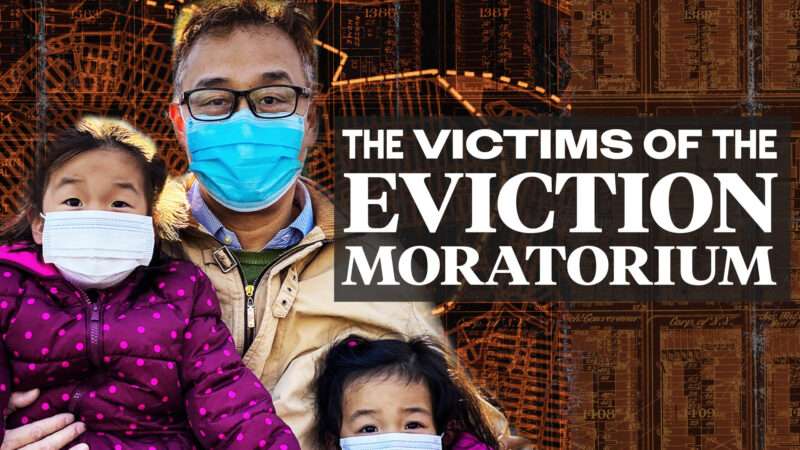“Blackstone is one of the largest landlords in [the] world,” tweeted the New York tenant advocacy group Housing Justice for All in May. “We know they’re rich enough to #CancelRent, and we’re going to make them.”
And then there’s Chao Huai Gao, an immigrant from Zhengzhou, China. He owns a modest two-story house in Queens and isn’t rich enough to forgo rental income. He tells Reason that the emotional distress of having an occupant who isn’t paying rent and who he can’t evict has him contemplating “jumping off of a building.”
Gao came to the U.S. in 1999, working in New York restaurants and nail salons and doing interior renovation. “I haven’t taken a day off since I came to America,” he says. In 2017, he and his wife, who is a caretaker, made a down payment on a house as an investment property, supplementing their savings with a loan from their family in China. To cover their mortgage, they rented out both floors and moved into a cheap studio apartment nearby with their two young daughters.
In March 2020, the college students sharing the second-floor apartment gave notice that they were moving out. After the apartment was vacated, a neighbor alerted Gao that he noticed that the lights were on at night. Soon after, Gao discovered that one of his former tenants had given her keys to a friend who had moved in without permission.
Gao has never met the squatter now living in his house and is afraid to contact this person out of fear that he’ll be sued for harassment. The squatter, who is a dropout from an elite private university, has never offered to pay rent. (Reason was unable to reach him for comment, so we’re not including his name in this story.)
Under New York state law, because the squatter has been in the apartment for more than 30 days, retaking possession will require a court order—but Gao can’t obtain a court order, because New York’s housing courts have been mostly closed during the pandemic. Gao tells Reason that he’s in a state of personal crisis, hemorrhaging money, and consumed with worry about losing his home.
Gao is part of an association of about 200 Chinese immigrant landlords in New York City with tenants who have stopped paying rent. They’re speaking out about the impact of the government’s decision to temporarily halt evictions—a policy championed by the #CancelRent movement. On September 4, 2020, the Centers for Disease Control and Prevention (CDC) issued a national eviction moratorium that is currently set to expire at the end of March. New York is one of many states that has also passed a series of administrative orders and temporary laws halting evictions on top of the CDC order.
Although technically these measures are intended to help tenants directly impacted by the pandemic, in practice they’ve brought New York’s eviction proceedings to a complete halt. From mid-March through the end of November, in a typical year, there would have been about 14,000 evictions in New York City. In 2020, over this same period, there were just 2. New York now has a backlog of 200,000 eviction cases that pre-date COVID-19.
“The pandemic is proving…that we need to advocate vigorously for projects and policy proposals that get us closer to a universal right to housing,” says Cea Weaver, the campaign coordinator for Housing Justice For All. “We need to sort of think about the role that exclusion and profit, which are the sort of characteristics of the private property market, have played and think about different systems and structures that we could put into place that would help more people be housed.” Weaver, who’s a rising star in New York political circles—she was recently nominated to join the city’s powerful planning commission—describes the relationship between landlords and tenants as “exploitative.”
But denying landlords legal recourse to enforce their contracts is more likely to exacerbate housing shortages. In New York, the moratorium is reminiscent of policies of the 1960s and ’70s that also undermined private contracts between landlords and tenants, driving owners to abandon their buildings and leave entire neighborhoods for dead.
One problem with the eviction moratorium is that, in practice, it doesn’t only impact those in need. It is making widespread abuse possible, in which tenants with the means to pay their rent are taking advantage of the situation to live in their apartments at no cost.
Take Won, a Chinese immigrant landlord who asked that we only use her last name. She owns a two-family house in Queens and works as a home health aide caring for an elderly couple. Her husband is a waiter at a restaurant in Manhattan’s Chinatown, though he’s barely been able to work since the pandemic began. Won says her tenant owes her more than $80,000 in back rent. “I just want the government to open the court,” she tells Reason.
Won says that if her tenants were unemployed or financially distressed, she would be willing to work with them. “These people, no money, I can help. Pay later,” she says. “But these people, no. The people have money.”
Reason wasn’t able to reach Won’s tenants for comment, so we’re not using their names in this story. But we did find that the father in the family is currently employed in the construction industry, and that the tenants are renting a second apartment in a house in Queens Village, where they’ve also stopped paying rent and owe $12,000 to the couple that owns the house, who are also Chinese immigrants.
Many of the working-class landlords in Gao’s group say they’re in danger of losing everything. The government has backed them into a situation in which they have no choice but to maintain their buildings at a loss.
One Chinese immigrant landlord, who works as a hairstylist and asked to remain anonymous, tells Reason that she used money that her mother had saved, over the course of 20 years working seven days a week in a nail salon, to make a down payment on a house in Queens in 2016. She fears that all of that hard work will now go to benefit her tenant, who has stopped paying rent and who she says is mentally unstable. “We just want to take back the house we bought ourselves. Is that wrong?” she tells Reason through an interpreter.
This group has come together, mostly in WeChat groups, where they commiserate and strategize. At a protest in October, a few hundred landlords—most of them immigrants—huddled under umbrellas outside New York City Hall, holding signs and chanting, “Fair laws for landlords!”
According to Michael Wang, a Chinese immigrant and businessman who organized the recent protests, foreign-born New Yorkers are more likely to buy property for cultural reasons. “We think it’s relatively less risky to put money into property,” he tells Reason through an interpreter. “Investing in property is a relatively less risky and easier investment for people who just came to the U.S. with limited English.” For Gao and many immigrant landlords, owning property turned out not to be an easy investment after all.
Gao says his squatter is getting away with “robbery.” Weaver calls that statement “deeply misleading.” Weaver, who the real estate magazine The Real Deal dubbed the “tenant movement’s giant killer” for her behind-the-scenes role in the passage of a 2019 state law strengthening New York’s rent regulation laws, says the eviction moratorium is just a “pause” because it doesn’t mean that “the landlord can never collect the rent.”
In practice, though, collecting rent money will be extraordinarily difficult after the moratorium is lifted. The case backlog in housing court could mean that landlords will wait years for their cases to be heard, and recovering large sums of money is difficult under the best of circumstances. Nativ Winiarsky, a New York attorney specializing in landlord-tenant litigation, tells Reason in an email that he sees “little chance that landlords will be able to fully recover the significant arrears that will have accumulated.”
“Those are part of the costs of being a landlord,” Weaver responds.
Owners say that having almost no legal recourse when their tenants don’t pay their rent was not part of the deal when investing in real estate. Landlord groups around the country have sued on the grounds that halting the judicial process that allows them to retake their property violates their due process rights, and that the national moratorium is an unconstitutional expansion of federal power.
One Chinese immigrant landlord, who asked to remain anonymous, reports that she worked as a housekeeper at a hotel that recently closed down. She says her tenant stopped paying rent over the summer and was demanding a $12,000 cash payment to move out.
“I worked in the United States for a whole 29 years. I worked to the point that my waist needs surgery. I can’t even sell my house.” she tells Reason through an interpreter. “Now my waist hurts so much. I’m jobless….I really can’t sleep at night. I really don’t know how to live anymore.”
The media has predicted a huge “wave of evictions” (see here, here, here, and here) nationally if the moratoria are lifted. In New York, tenant activists dragged furniture into the streets at a protest in October to dramatize the potential impact.
But the soaring rental vacancy rate has made landlords more willing than ever to communicate with their tenants and offer rent reductions. Winiarsky says that the “large majority” of his “clients are doing everything they can to work with their tenants” because they recognize that “everyone is hurting.” Winiarsky says his office is “inundated right now drafting deferment and rent reduction agreements.”
In New York, before the pandemic, only about 1 in 10 eviction filings ended in a city marshall or sheriff physically removing a tenant from a dwelling. But because there existed a process through which landlords could enforce their contracts and get tenants who weren’t paying their rent to come to the negotiating table or move out, they had legal recourse.
Some tenants may be purposely targeting immigrant landlords because they may deem them less equipped to navigate New York housing law, but they’re not the only ones who are being taken advantage of. Sharon Redhead, who owns a building in Brooklyn, told the New York Daily News that some of her tenants who are out of work have kept up with their rent, while others with jobs “aren’t paying any rent at all.” Clarence Hamer, according to the Daily News, is the owner of a two-family home with a tenant who isn’t paying rent but is subletting rooms at a profit.
The New York Post told the story of 88-year-old Harlem landlord David Howson, who suffers from Alzheimer’s disease and has a tenant who hasn’t paid rent since 2016. “We are completely destitute,” Howson’s daughter told the Post.
Weaver says tenants taking advantage of the eviction moratorium not to pay their rent are “aberrations,” and she cites recent census survey data showing that renters are more financially distressed than those who own their own homes. Newspapers have recounted the stories of many tenants in crisis, such as Diba Gaye, whose wife recently died of heart disease and who lost his job stocking groceries. “I don’t want to lose my house too,” he told The New York Times. There’s also Halima Abdul-Wahhab, who says that she and her two children are at risk of homelessness. “I’m at a job where I don’t make that much, but I just try to maintain as much as I can,” she said. “Rent is not the only thing that has to be paid every month.”
But these individuals can be helped through the direct aid that the government has been providing since the early days of the pandemic in the form of interest-free loans, stimulus checks, and a substantial increase in unemployment benefits. Cities and states have also spent billions on rent relief programs.
These programs bring their own problems and tradeoffs, and those funded through philanthropy have proven more effective than government-financed ones. But if tenants are receiving the aid they need, owners should still be able to turn to the courts if they don’t pay their rent.
Weaver says this approach fails to help populations that are hard to reach with direct aid, such as undocumented immigrants. Her organization helped to draft a proposed state law under which the government would cover missing rent, no matter the reason tenants hadn’t paid, and with strings attached for landlords who accept the money, such as a provision requiring that they freeze rents for a period of 5 years. She said this approach would “help to get the money out the fastest.”
But there’s another reason Weaver and her political allies want to make landlords dependent on federal subsidies. Emergency policies enacted in times of crisis are prone to becoming permanent, which some members of the #CancelRent movement say is the goal.
Weaver would like to see the entire real estate industry restructured in a model akin to public housing—but for rich people too.
“In public housing, people are paying 30 percent of their income,” Weaver told Reason. “What I am envisioning is a world in which housing is owned by a collective and people are paying 30 percent of their income in order to live in their housing. If your income is zero, you pay zero. If your income is $500,000 a year, you’re paying 30 percent of that.”
When asked how the federal government could afford such a program, Weaver told Reason that it could “print” the money.
“America is beautiful,” Gao, the Queens landlord with a squatter in his second-floor apartment, tells Reason. “But [when] nobody pay[s] rent, [it] is not beautiful.”
When Gao, and other immigrant landlords, decided to come to the United States to create a better life, this is not the American dream they thought they were buying into.
Photo Credits: Erik McGregor/Sipa USA/Newscom; Erik McGregor/Sipa USA/Newscom; Erik McGregor/Sipa USA/Newscom; Brian Branch Price/ZUMA Press/Newscom; Erik McGregor/Sipa USA/Newscom; Brian Branch Price/ZUMA Press/Newscom; Erik McGregor/Sipa USA/Newscom; Erik McGregor/Sipa USA/Newscom; Erik McGregor/Sipa USA/Newscom; Erik McGregor/Sipa USA/Newscom; Erik McGregor/Sipa USA/Newscom; Brian Branch Price/ZUMA Press/Newscom; Brian Branch Price/ZUMA Press/Newscom; Brian Branch Price/ZUMA Press/Newscom; 1354732 © Jimmy Lopes | Dreamstime.com;ID 3180810 © Photo168 | Dreamstime.com; SMXRF/starmaxinc.com/Newscom; Erik McGregor/Sipa USA/Newscom; Erik McGregor/Sipa USA/Newscom
Footage Credit: Damian Bartolacci/Pond5
Music Credits: “January,” by Kai Engel, Attribution-NonCommercial 4.0 International (CC BY-NC 4.0).
Written and produced by Jim Epstein; graphics by Isaac Reese; translation by Shuang Li; audio post-production by Ian Keyser

from Latest – Reason.com https://ift.tt/2ZOMrbT
via IFTTT





